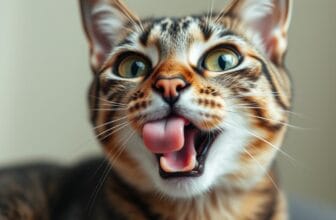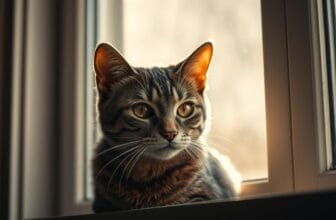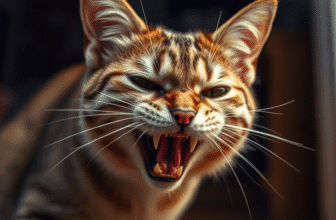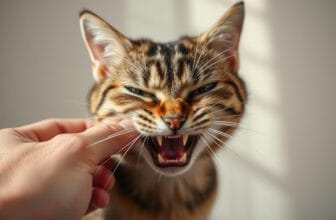
Table of Contents
If you’re a cat owner, you’ve likely experienced the unnerving yet endearing sensation of your feline friend locking eyes with you for minutes on end. Whether you’re eating, working, or relaxing, that unblinking stare can leave you wondering: Why does my cat stare at me? While it’s easy to assume they’re plotting world domination, the truth is far more nuanced.
Cats communicate volumes through body language, and their gaze is a critical part of their toolkit. This article dives into the science and psychology behind this behavior, uncovering eight possible reasons—from affection and curiosity to health concerns. By the end, you’ll not only understand what your cat’s stare means but also learn how to respond appropriately. Let’s decode the mystery together.
Understanding Feline Behavior: The Role of Eye Contact

Before unraveling the “why,” it’s essential to grasp how cats perceive eye contact. Unlike humans, who use prolonged gazes to convey trust, cats view direct stares as a potential threat in the wild. However, domestication has nuanced this instinct.
The Basics of Cat Communication
Cats rely heavily on non-verbal cues: tail flicks, ear positions, and yes, eye contact. A slow blink, for instance, is a “kitty kiss” signaling trust, while dilated pupils may indicate excitement or fear. Staring falls on a spectrum between these extremes, influenced by context and your cat’s personality.
Why Eye Contact Matters to Cats
In multi-cat households, dominant cats often stare to assert authority. Conversely, averted eyes signal submission. With humans, cats adapt their behavior based on positive reinforcement. If staring earns them treats or attention, they’ll repeat it.
8 Reasons Why Your Cat Stares at You
1. Affection and Bonding
Your cat’s stare might be their version of a hug. When cats feel safe, they hold eye contact and slowly blink—a behavior studied by researchers at the University of Sussex. Try reciprocating with a slow blink; many cats respond in kind, strengthening your bond.
Example: A 2020 study found that cats are more likely to approach humans who slow-blink first, confirming this as a trust-building gesture.
2. Hunting Instincts and Playfulness
Cats are natural predators. A fixed gaze could mean they’re “practicing” stalking, even if their “prey” is your moving hand or a shoelace. This is especially common in kittens refining their skills.
Pro Tip: Engage them with interactive toys like feather wands to satisfy this instinct safely.

3. Curiosity About Your Actions
Cats are observant creatures. If you’re cooking, typing, or folding laundry, they might stare to decipher your activity. Their curiosity peaks when you deviate from routines—like bringing home groceries.
4. Seeking Attention or Resources
That intense stare while you’re eating? It’s likely a plea for food or playtime. Cats learn that staring grabs human attention, especially if rewarded with treats or pets.
Case Study: A survey by PetMD revealed that 62% of cats stare at owners during mealtimes, linking the behavior to food-seeking habits.
5. Medical Issues or Discomfort
Sudden, prolonged staring—especially if paired with lethargy or vocalizations—could signal pain, vision problems, or cognitive decline. Senior cats with dementia may stare blankly at walls.
When to Worry: Consult a vet if the behavior is new or accompanied by other symptoms.
6. Territorial Behavior
Cats are territorial. If they stare while perched in a high spot (like a cat tree), they might be monitoring their domain—and you’re part of it.
7. Learned Behavior (Positive Reinforcement)
If you’ve ever given your cat a treat after they stared, they’ve learned that staring works. This operant conditioning is common in food-motivated cats.
8. Emotional Connection and Trust
In multi-pet homes, a cat’s stare at you might reflect their preference for your companionship. It’s their way of saying, “You’re my favorite.”
When Should You Be Concerned?
Signs of Aggression vs. Affection
A loving stare involves soft eyes and slow blinks. Aggressive stares feature dilated pupils, flattened ears, and a stiff posture. Context matters: A cat guarding their food bowl stares differently than one curled on your lap.
Prolonged Staring and Health Red Flags
Unbroken, vacant staring—especially at walls—may indicate:
- Hypertension: Common in older cats, linked to kidney disease.
- Seizures: Partial seizures can cause “spacing out.”
- Cognitive Dysfunction: Similar to dementia in humans.
Action Step: Schedule a vet visit if paired with disorientation, weight loss, or changes in appetite.
How to Respond to Your Cat’s Staring

Positive Interactions
- Slow Blink Back: Build trust by mimicking their “kitty kiss.”
- Engage in Play: Redirect hunting instincts with a laser pointer.
- Respect Their Space: If the stare feels tense, avoid forcing interaction.
When to Consult a Vet
Rule out health issues if the behavior is sudden or unusual. Blood tests and ultrasounds can diagnose underlying conditions.
Conclusion
Your cat’s stare is a window into their world—a blend of instinct, emotion, and learned behavior. Whether they’re seeking love, food, or simply satisfying curiosity, understanding their motives deepens your bond. Pay attention to accompanying cues, and don’t hesitate to seek veterinary advice if something feels off.
Found this helpful? Share your cat’s quirkiest staring habits in the comments, or subscribe for more feline insights!
FAQ : why does my cat stare at me
Why does my cat stare at me without blinking?
Cats often stare unblinkingly when focused (e.g., tracking prey or anticipating play). However, if paired with rigid posture, it could signal stress.
Is it bad to stare back at my cat?
Prolonged direct stares may intimidate them. Instead, offer slow blinks to communicate friendliness.
Why does my cat stare at me while I sleep?
They might be guarding you (a sign of loyalty) or curious about your stillness. Some cats also wake owners for food or attention.
Can staring indicate a health problem?
Yes. Sudden staring spells, especially in older cats, may signal hypertension, vision loss, or neurological issues. Consult a vet
Why does my cat stare at the wall?
They may detect pests (e.g., insects) or shadows. However, repetitive wall-staring warrants a vet check for hallucinations or seizures.
How do I stop my cat from begging with stares?
Ignore the behavior and reward them only when they’re calm. Consistency is key to breaking the habit.
Do all cats stare for the same reasons?
No—personality, breed, and upbringing influence behavior. For example, Siamese cats are famously vocal and visually attentive.







